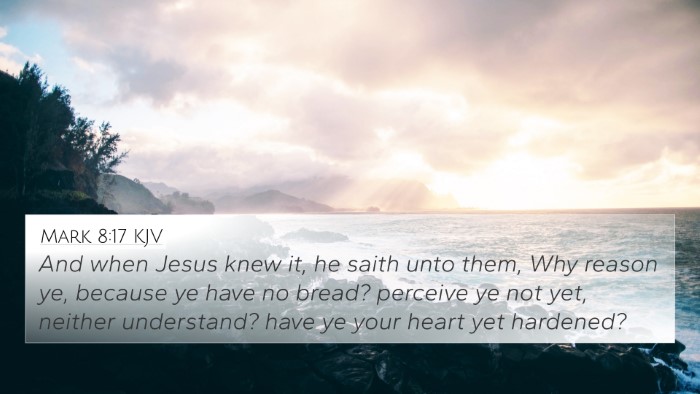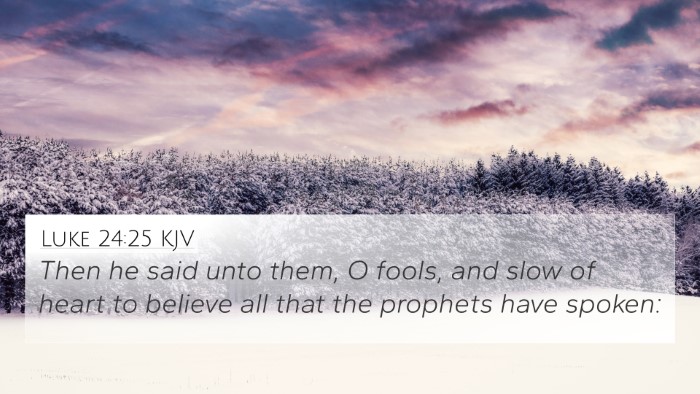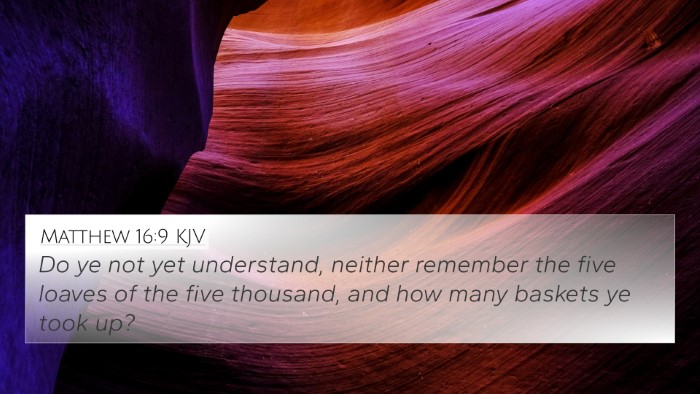Understanding Mark 6:52
Mark 6:52 states: "For they considered not the miracle of the loaves: for their heart was hardened." This verse captures a critical moment in the narrative where the disciples failed to grasp the full significance of Jesus’ miracle of the feeding of the 5000, reflecting deeper spiritual truths about belief, understanding, and the nature of God’s kingdom.
Summary of the Verse Meaning
In analyzing this verse, several public domain commentaries shed light on its meaning and implications:
- Matthew Henry: Henry emphasizes that the disciples' hard hearts led to a lack of understanding. He elaborates that though they witnessed Jesus’ miracles, they still struggled to recognize His divine authority and power. This hardened state prevented them from fully appreciating the significance of His works.
- Albert Barnes: Barnes notes that the phrase “considered not” indicates a lack of reflection on prior miracles, suggesting a tendency to overlook God’s actions in their lives. He argues that this response can be a common pitfall for believers, as familiarity with divine acts can dull spiritual perception.
- Adam Clarke: Clarke highlights the spiritual implications of “hardened hearts.” He suggests that their disbelief did not stem from ignorance but from a willful rejection of acknowledging Jesus’ power. Clarke urges readers to strive for a receptive heart, open to God's truths.
Spiritual Implications
This verse teaches about the dangers of spiritual dullness and the importance of reflecting on God’s past acts. Believers are encouraged to seek deeper understanding and connection with the works of Jesus to enhance their faith.
Cross-References and Thematic Connections
Mark 6:52 can be linked to several other Bible verses that enhance its meaning and provide a richer context. Here are some significant cross-references:
- Matthew 14:20: Relates to the feeding of the 5000, illustrating the miracle that the disciples had witnessed.
- John 6:14-15: Highlights how the people recognized the miracle and wanted to make Jesus king, contrasting with the disciples' misunderstanding.
- Mark 8:17-21: Discusses the disciples’ continued lack of understanding regarding bread and miracles, emphasizing their spiritual blindness.
- Hebrews 3:8: Warns against hardening hearts like in the wilderness, showcasing the significance of responsiveness to God’s revelation.
- Ephesians 4:18: Touches on the concept of alienation from a life in God, similarly addressing hardened hearts.
- Isaiah 6:10: A prophetic mention of hardened hearts, illustrating a historical pattern of resistance to God's message.
- Matthew 16:9-10: Jesus reminds the disciples about the miracles of bread and fish, highlighting their forgetfulness and lack of reflection.
Lessons Learned
The lessons derived from Mark 6:52 are profound:
- Believers must reflect on God’s past miracles to build their faith and understanding.
- Awareness of spiritual conditions, such as hardness of heart, is crucial for spiritual growth.
- The importance of unity among believers in recognizing and proclaiming God’s works.
Tools for Further Study
For those interested in deeper exploration, several tools and methodologies can assist in discovering cross-references and connections in Scripture:
- Bible Concordance: A comprehensive tool for finding words and concepts across various passages.
- Bible Cross-Reference Guide: Provides a structured method for linking similar verses and themes.
- Cross-Reference Bible Study: Encourages thematic explorations of subjects, promoting a broader understanding of Scriptures.
- Inter-Biblical Dialogue: Engages discussions on how different parts of the Bible converse with one another.
Conclusion
Mark 6:52 serves as a profound reminder of the need for vigilance in faith and understanding. By cross-referencing this verse with others, believers can draw a network of connections that deepen their appreciation of God’s work through Christ. This verse isn’t just historical; it serves to challenge and encourage modern believers to remain responsive to God’s revelations.










